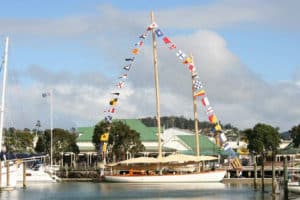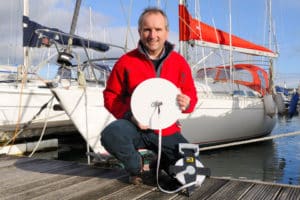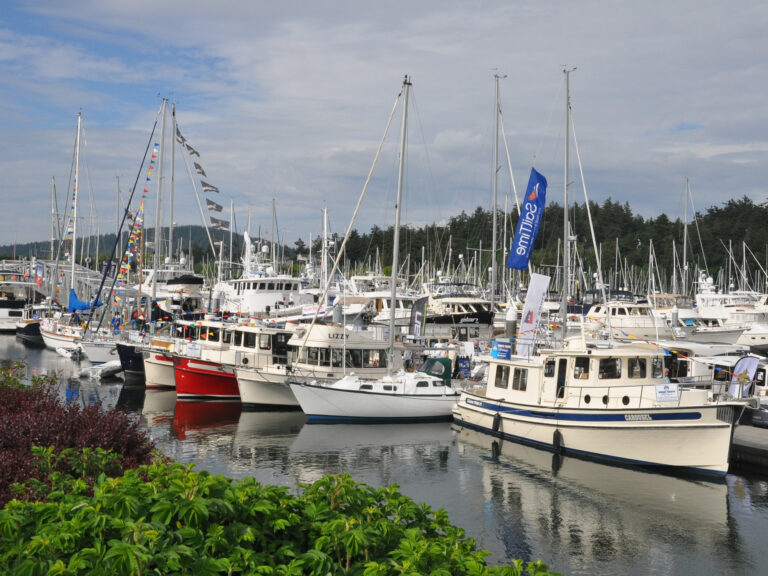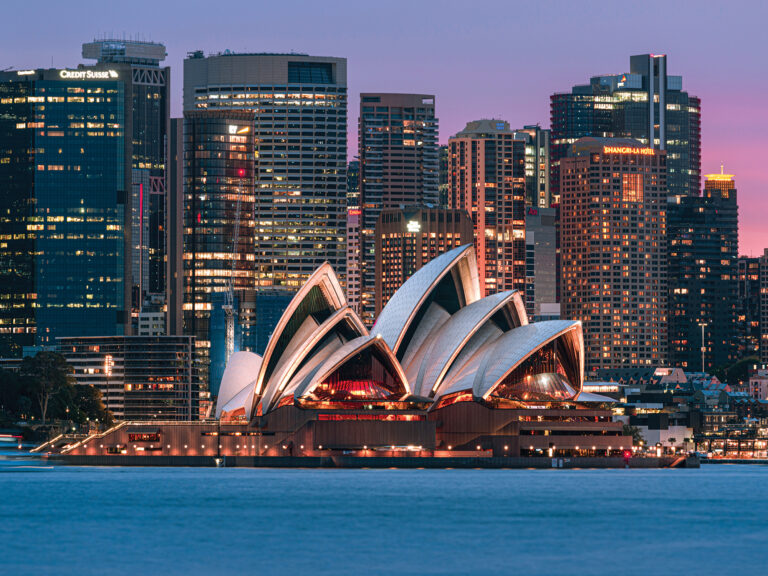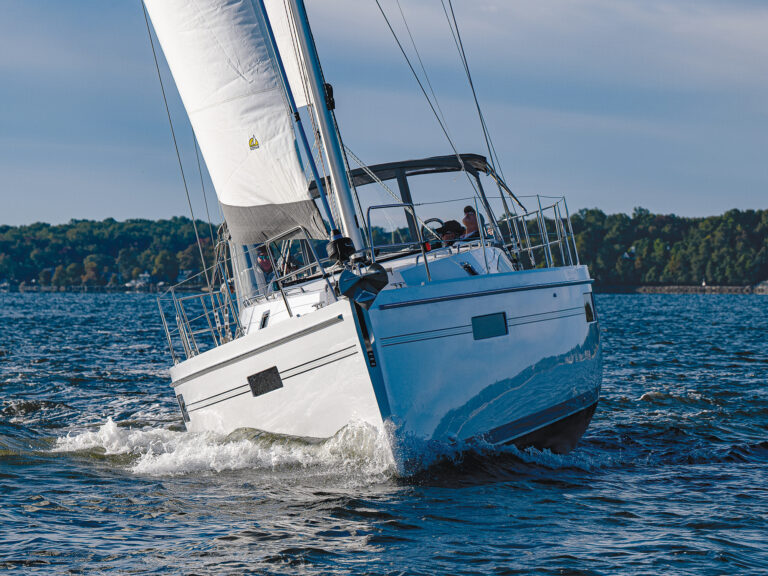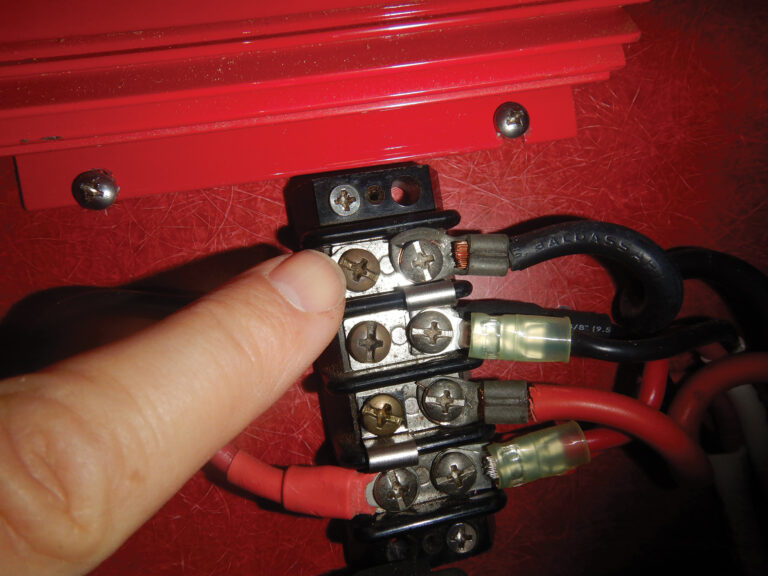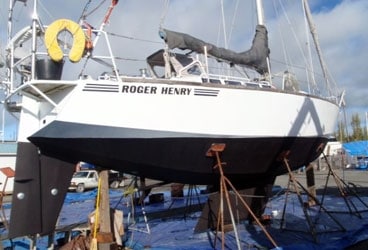
boatyard blues RH 368
I’m the resident writer on Roger Henry. Diana is the resident photographer. To uphold the honor of my profession against hers, I have often argued against the adage “A picture is worth a thousand words”.
But when the crunch came, I faltered. The Travelift operators at the Port Townsend Boat Yard know their business well, but not my boat specifically. Rather than use words to explain the complicated underwater layout of ice-deflector fins, exposed stern tube, transducer locations, and slanted fin keel, I simply handed the driver a photograph of Roger Henry’s underwater profile with dotted lines overlaid to indicate the proper location for the slings. He nodded in appreciation and snatched her out of the water like a toy from a tub.
Apparently the cayenne pepper that I’d laced my anti-fouling paint with during our last haulout in Japan worked as an effective biocide. The boat’s bottom wasn’t the usual National Marine Reserve I find when I finally cough up the cash and haul out.
As Diana and I jet-blasted the bottom, I had momentary visions of that mythical quick and clean haulout sans the aching back and raccoon eyes from holding a heavy sander above your head for three days-or is that eternities?
But it wasn’t to be. The high-pressure stream blew away bubbles in the paint, indicating either an electrolysis problem with our steel hull or a complete paint failure, depending on which expert I talked to.
Once the boat was chalked up, Diana and I talked it over. We decided that we simply had to keep to our sailing schedule in order to be south of 10 degrees N before the cyclone season heated up in the northern tropics. The best we could do for now would be a lick and a promise, as the Kiwis say. That is, repair the worse patches and postpone a complete sandblast and bottom job until New Zealand.
I borrowed sanders, vacuum, sawhorses, extension cords, and ladders from our winter dockmates Chris and David. Diana laid out brushes, rollers, masking tape, and thinners. We threw ourselves into the task.
Grind, dust, prep, and paint. Repeat. Change zincs, clean strainers, repitch prop, dissemble the wind vane, change out the exhaust system, fair the topside gauges, caulk the deadlights, mark the anchor chain, ad infinitum.
I should’ve bought shares in the chandlery shop, as I felt like I singlehandedly rescued its financial year. David works across the street from the boatyard at Henry’s Hardware. When I met him at the cash register for the fourth time in a single day I said, “We can’t go on meeting like this.”
The stern of Roger Henry was positioned right up against the chainlink fence beside the main parking area, ensuring a steady stream of passersby.
As required by law, “Missoula, MT.,” our port of registration, is displayed in 3-inch block letters on our transom. It was around the 10th or 11th time that someone asked how I got the boat from Montana to here that our proximity to the road began to feel like a problem. The real story was taking too long to tell, so I began joking, “Down Interstate 90, but the tacks were tight.”
I like meeting new people and hearing their stories. I like talking nautical shop, for there’s always something to learn. But the steady stream of drop-ins demanded I take a tool-down position far too often. When my worksite began to look as numerous and idle as a Chicago street crew’s, I employed a devious ruse. I draped a tarp over the fence, ostensibly to block the wind but in reality to create a sense of border. Then my visitors just walked around.
By the end of the week, my feelings were best described by our winter dockmate, Captain Jan Abbott-Mondragan of the sloop Tortue, with this song she wrote when inspired by her haulout in this very yard.
The Boatyard Blues
I’ve got the boatyard blues.
I’ve got the small-port news.
(You know), my time’s a “wastin”
while the weather holds true.
(You know) I’d rather be sailing
than standin’ here with you.
You’ve (just) gotta let me be
I’ve got so much work to do.
I just spent another hundred.
I got the boatyard blues.
I’ve got to scrape that paint.
I’ve got to change out parts.
I’ve got to listen to the opinion
of those boatyard old farts.
I’m gonna drink some beer.
I’m gonna break some hearts.
I just spent another hundred.
I’ve got the boatyard blues.
(bridge)
And you know, I’ve got paint on my jeans.
And you know, I’ve got glue in my hair.
My fingernails-so dirty, broken, I don’t even care.
I just spent another hundred.
I’ve got the boatyard blues.
(spoken rapidly)
(I) just spent my last dollar on a piece of sandpaper,
and I’m feelin’ mean.
I swear this is the last day
I wash up in a bucket of Toluene.
My good vocabulary has just turned obscene.
I just wanna say good-bye
to these boatyard blues.
Oh, when all the work is done
and we splash back in,
you know the lady’s lookin’
really, really good again.
You’ve just gotta’ let me be.
I’ve got to catch that sailin’ wind
and say good-bye to these boatyard blues
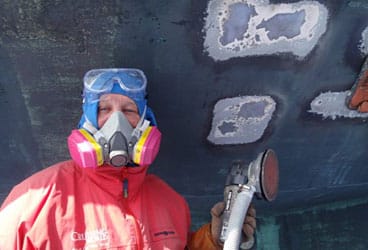
Diana Simon| |Chemical Alvah, all geared up for a day’s work on Roger Henry.|
After 10 days of concentrated effort, a worn path to the A.T.M., and a mercy run or two to the microbrewery located right in the center of the boatyard-how thoughtful is that?-we did finally say good-bye to those boatyard blues.
As the Travelift operator gently placed Roger Henry back where she belongs, I looked over the many vessels scattered throughout the large yard. I’ve been in boatyards from Asia to Africa, Australia to Argentina. You may do your work in different languages and currencies, but in one sense, they’re all the same. A boatyard can be viewed as a hospital or a graveyard. The amount of dedication, time, effort, and money mustered up by each boat owner determines which.
In the center of the yard, a classic wooden yawl lay with its ribs splayed open ready for complex and expensive open-heart surgery. Next to it an old ketch grew a gangrenous green, showing signs of unconscionable neglect and terminal decline. One will eventually be repaired and relaunched and carry its owner to dreamed-of shores. The other will be ignobly chainsawed up into conveniently sized pieces, hauled away, and be all-too-soon forgotten.
This boating thing is hard, perhaps because nothing this good should come too easily. It’s demanding, and at times even demeaning. You need to really want it, then get up and really do it. And then, if you’re lucky, you get to do it again. In that sense, I should feel happy to one day soon say hello to those boatyard blues.

